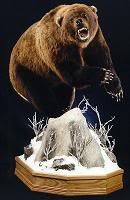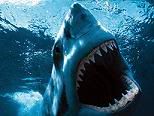Unholy Battle
The question is as old as time itself; the first time the hulking, furry, wood-walker emerged on the face of the earth to live in the same timespan as the ancient beast of the seas. Who would win in a fight -- a bear or a shark?

 And where would the battle be staged? The reason these animals have never met in the field of combat is because each is the king of his own territory and whenever one of them wanders into the other's territory, it is doomed. If a bear were to ever find itself adrift in the south Pacific, it surely would be destroyed. If a shark were to fall ashore the Alaskan peninsula, it surely would be eradicated. So the trick really ends up being in the staging of the battle. New technology must be invented so that each animal recieves all of the benefits of their home court, because the away team always loses in this circumstance. I suggest a gelatin-like substance that the bear can move through as if it were air and that the shark could move through as if it were water. The bear would always be grounded and the shark would essentially be able to "fly". The turf of the arena would be rocks and sandy dirt, because it could similtaneously represent the bear's natural habitat and the ocean floor. However, the ground would have to suit the bear's tastes, as the shark is entirely unaffected by the ground.
And where would the battle be staged? The reason these animals have never met in the field of combat is because each is the king of his own territory and whenever one of them wanders into the other's territory, it is doomed. If a bear were to ever find itself adrift in the south Pacific, it surely would be destroyed. If a shark were to fall ashore the Alaskan peninsula, it surely would be eradicated. So the trick really ends up being in the staging of the battle. New technology must be invented so that each animal recieves all of the benefits of their home court, because the away team always loses in this circumstance. I suggest a gelatin-like substance that the bear can move through as if it were air and that the shark could move through as if it were water. The bear would always be grounded and the shark would essentially be able to "fly". The turf of the arena would be rocks and sandy dirt, because it could similtaneously represent the bear's natural habitat and the ocean floor. However, the ground would have to suit the bear's tastes, as the shark is entirely unaffected by the ground.So, specifically which shark and which bear do we choose for this experiment? It seems obvious to choose the most beastly beast from each species, so my vote goes to Ursus arctos horribilis middendorfi for the bear and Carcharodon carcharias for the shark. At this point, I feel a little more background on each animal is needed.
Carcharodon carcharias: The Great White Shark
The Great White Shark is more than an animal, it's a monster. While the phrase "blood-thirsty" has been applied to all sorts of wretch throughout history, few take it so literally as the great white shark. This animal is actually thirsty for blood. Only the sweet taste of copper death running between several rows of serrated teeth can quench the immense palate of this barbarian from hell. Keep in mind that there is no other shark that is simply known as the "white shark"; this animal needed further classification for its overall grandeur, so man tagged "great" to the beginning of its name. Also keep in mind, that Great White is the name of one of the few bands on earth that killed their own fans. A vicious beast indeed.
Unlike other animals (aside from polar bears), great white sharks can feel the magnetic field of the earth. This ability grants them a sixth sense that detects the electromagnetic movement of
 animals through the water. Great whites are apex predators, meaning that no other creature on earth is so bold as to hunt one.
animals through the water. Great whites are apex predators, meaning that no other creature on earth is so bold as to hunt one.Their greatest sense, however, is their eyesight. But, sharks usually attack from below, so this would pose a problem in the battle, as the bear would always be below the shark. The great white would most likely have to be female, as they grow up to 1-2 meters larger than the males. The largest great white ever measured was 21 feet long. Typically great white sharks are 4-5 meters long, but larger ones are commonly known to grow up to 18 feet. Your average great white shark will weigh around 1.75 tons.
Cunning and speed are clear advantages to the great white, but its mouth is its primary - nay only - tactile organ. In a single bite, a shark of this stature will rip away thirty pounds of flesh. The teeth are designed to cleanly pull skin into the mouth. When it comes to hunting, the great white, like most sharks, is absolutely ferocious, coupled with a ruthless instinct, culminating in one of the world's most finely tuned killing machines.
Ursus arctos horribilis, middendorfi: American Brown Bear, Grizzly species, Kodiak sub-species
The Kodiak bear is the largest bear species on earth. It is a graceful beast, often underestimated in this specific battle due to its docile appearance. Make no qualms about it, a bear will kill you, however furry and friendly it looks. The end of its scientific name isn't "horribilis" for no reason. Where the shark has the streamlined ruthlessness, the bear has a majestic savagery. From biddable lumber to skull-crushing fury, the Kodiak will snap when it means business. And I don't just mean snap into a psychotic fury, but it will also snap every bone in your body with a calmness that is more eerie than it is disciplined. Oh, and I was addressing bison in that last paragraph -- not men -- you know, because a bear can decimate a bison's spine in a single swipe. You did know that, right?
 While standing on it's hind legs, a Kodiak measures 10 feet from the ground up. The larger males can reach standing heights of 13 feet. Typically, they will weigh around 1,500 pounds. Being omnivores, bears rely both on vegetable matter and meat. Particularly interesting is that bears -- like sharks -- are apex predators. The bear's best sense is its ability to smell. This trait will have little to no effect in this battle, though, because the bear will not be hunting the shark.
While standing on it's hind legs, a Kodiak measures 10 feet from the ground up. The larger males can reach standing heights of 13 feet. Typically, they will weigh around 1,500 pounds. Being omnivores, bears rely both on vegetable matter and meat. Particularly interesting is that bears -- like sharks -- are apex predators. The bear's best sense is its ability to smell. This trait will have little to no effect in this battle, though, because the bear will not be hunting the shark.While the bear's jaws are very useful in hunting and catching prey in the wild, I doubt that it would be able to get a good grasp of a large great white shark. The true power of the bear lies in its massive forearms and extremely durable claws. A bear can literally decapitate a man in a single swipe, and crush most other things. Speed will be of great advantage for the bear as well. Despite their size, Kodiak bears can run at speeds of 35 mph, and have incredible stamina, allowing them to maintain that speed for extended periods of time.
Bears can also climb trees, but that won't really matter for this fight.
Comparative Statistics
Speed:
Bear: 35 miles per hour sprinting
Shark: 25 miles per hour cruising, capable of 35 mile per hour bursts
Weaponry:
Bear: Forty-three teeth (reaching 2 inches in length) designed for puncturing flesh. Primarily will use arms (each roughly measuring 5 feet), each equipped with five 4+ inch claws. The arms are designed to batter/kill opponent and crush bones/organs.
Shark: Three thousand seperate serrated teeth (reaching 2.5 inches in length) positioned in three rows and under the gums for easy replacement. The teeth and jaws are designed to tear flesh from the opponent.
Opposition in their own territory:
Bear: Only true threat is hunters/poachers. In a fictional setting, could arguably disable a silverback gorilla, crocodile, lion, or other land predator (all of which could constitute further debate). Additional note -- in Asia, brown bears have been known to hunt and kill tigers.
Shark: Typically avoided by humans due to aura surrounding its ferocity, primarily implemented by the film Jaws. In a fictional setting, could arguably disable any other shark, dolphin, fish, or whale (given enough time, on the last one). Giant squid will not be considered in a fictional battle, because nothing is known about them besides what stoned college students make up.
Size:
Man (from head to feet)...: ------ approx 6 feet
Bear (from head to feet)...: ------------ approx 12 feet
Shark (from fin to snout)..: ------------------ approx 18 feet
Weight:
Bear: 1,500 pounds
Shark: 1.75 tons
I don't know the conversion at all. You figure it out. The shark is heavier, I would say.
The Battle
And we finally arrive at the point of combat. Why is this fight taking place? I suppose the answer would be to prove who is the ruler of all the animal kingdom. Some say that the lion holds that position, but c'mon, either a bear or a shark would kill the shit out of a lion.
I'm not going to state which animal I think would win this fight. I chose not to reveal my position out of respect for the views of the reader and out of respect for each animal. I consider both bears and sharks to be the rulers of their realms, and regard each animal as a dazzling example of glowing brilliance. Some people know my opinion and disagree (Paul/most of my friends), but that is not what is important here.
...Well it is what's important, but whatever.
The shark has the benefit of being guaranteed that it can stay permanently out of reach of the bear. And I feel that, in order to win, the shark is going to have to rely on its long game. The risk of staying close and grappling with the bear would be too risky, so the shark would have to stay high, swing around the back and dive into the bear. If the shark was able to maneuver around behind the bear and charge with a 35 mph dash, it would most likely be able to knock the bear over. The shark's primary objective should be to get the bear onto its stomach. An exposed stomach would be a deadly -- and delicious -- striking point. If the shark can land an entire mouthful, it would spell game over for the bear.
So the eventual goal of the shark would be to land a healthy bite. Well, not healthy for the bear. So... land a lethal bite. Let me break it down:
1. Exploit exposed regions of the bear.
2. Bite.
3. Swallow or spit out onto dead bear as a sign of disrespect.
The shark doesn't neccesarily need to knock the bear over. Suppose the shark can't get the bear to tumble onto its back -- the bear is the faster animal, after all. While it might seem logical for the shark to attack one of the bear's arms, it would be too risky. If it locked onto one arm, the bear would swipe with its other paw, potentially killing the shark or brutally damaging it. Sharks don't have bones, rather the substantially weaker cartilage. A bear would have no problem snapping the shark's neck as it latched onto an arm. If it was the shark's goal to disable the bear's arms, she would have to strike from behind into the shoulder blades, where the bear would have trouble reaching. However, this would not kill the bear, only hurt it.
Bears have incredible stamina, learned from constant grappling with other males. The shark needs a quick kill, not a prolonged battle. If the shark were to attack the bear in the side, from the armpit to the thigh, the results would potentially be lethal. The bear would surely die if a shark removed thirty pounds of flesh from its side.
The bear has several advantages, stamina being one of the most vital. During mating season, like most animals, bears engage in sparring bouts with other bears. Keep in mind that a bear swipe is able to kill an ox and behead a human, and these animals are throwing the same amount of force at each other. A concussive blow to a bear would take an incredible amount of force. The bear will rely on its powerful arms and girth as both defense and offense. A well placed wallop to the nose would disorient the shark, creating an opening for a major offensive maneuver on the bear's part.
Where the shark must rely on its long game, the bear must rely on its short game. A single swipe to the face or gills of the shark would critically wound it or destroy a section of protective cartilage. For the bear to succeed, he would have to enter a standing position as the shark maneuvered towards him from the distance. As the shark charges in, the bear could swat to repel the attack or collapse its weight in a grappling position onto the shark. The "bear hug" wrestling move was derived from this style of attack. The bear grapples the opponent, pushing them into the ground. By doing this, the bear can use the force of the ground as a trestle on which he will beat his opponent into submission. The shark's skin was not made to withstand oppressive bombinations, so a single firm movement would tear the shark open.
The bear's primary plan of attack:
1. Allow shark to charge
2. Swipe shark in the face (a strike to the eye would severely limit the shark's abilities. Great whites with hampered eyesight do not last very long in the wild. Furthermore, a shark's snout is highly sensitive)
3. Grapple onto shark
4. Beat shark into the earth
5. Walk away with general indifference to the events that just occurred
Both animals have a fairly open means of retreat if the battle becomes too intense to handle and they need time to recuperate. The bear is faster than the shark and has enough stamina to run away at top speed for a considerable time. The shark has the ability to retreat to the skies, out of the reach of the bear. The shark, obviously, has the benefit in this scenario, in that it can remain indefinetly at a distance from the bear; whereas the bear must constantly run to stay away from the shark.
If either animal decides to retreat during the course of the battle, the final outcome may take some time to reach. If both animals stay in the heat of battle the entire time, I doubt the fight would last more than 10 minutes. Both beasts are highly ferocious, so there would be no dilly-dallying or pussy-footing.
I feel that I've exhausted the idea at this point, so I'll leave the final decision up to you. You've heard the facts, you've heard my arguments. The great thing about this fight is that no matter which side you pick, we can all agree that this battle would be of biblical scale. Both bears and sharks are equally deserving of our awe and respect. This is because they would kill us if we thought otherwise.
The bottom line is in your hands. Well not really. You aren't a scientist or expert in this field. You're a philistine. Cast your vote here, anyway:


4 Comments:
i think the polar bear should fight the shark and would be better off. They rival grizzlys in size and are well adapted to marine conditions. Dolphins have been known to fight and kill great whites. Polar bears have been known to catch and eat narwhals and beluga whales. As far as speed though, the grizzly wins.
I think they would end up being friends like that snake and hamster...
In response to Brendan. Yeah I wasn't sure if I should use polar bear or Kodiak bear. After some research I found that the Kodiak is stronger and larger, so I used that. But I think a polar bear would easily rival a shark as well.
Um... you do realize all the shark would have to do is ram the bear going said 35 mph... and chomp on it's bits... bear stands NO chance
Post a Comment
<< Home